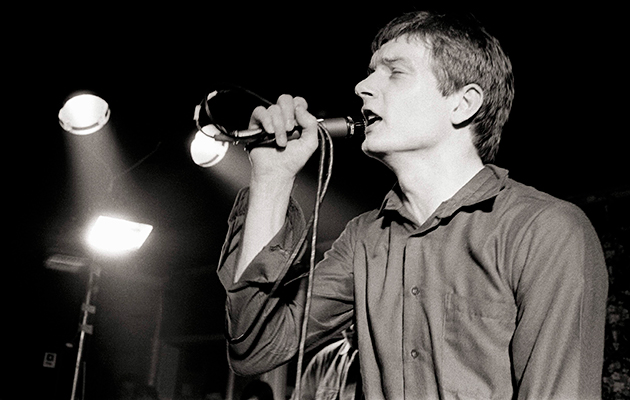Thirty-eight years ago, JOY DIVISION arrived in London. Their mission: to escape Manchester, have a laugh and make a classic second album. BERNARD SUMNER, PETER HOOK, STEPHEN MORRIS and those closest to them tell the full story of those initially thrilling, ultimately traumatic few weeks. A tale of Frank Sinatra, fancy sandwiches, all-night sessions and boyish pranks. And of IAN CURTIS who, unnoticed by his bandmates, was falling to pieces… Words: Stephen Dalton. Originally published in Uncut’s March 2010 issue (Take 154).
_____________________
Joy Division arrived in London in March 1980 to begin work on what would become Closer, their second album. The previous year had seen the band’s fortunes rise in a frantic, occasionally troubling, way, and the prospect of escaping from Manchester for a few weeks was enticing – not least to Ian Curtis who, away from his wife, Deborah, could live openly with Annik Honoré, a Belgian girl he had met at a London show in August.
Tony Wilson, the owner of Factory Records, installed them in a pair of adjoining flats on York Street, between Baker Street and Marylebone on the edge of the West End. Peter Hook, Stephen Morris and the band’s manager, Rob Gretton – “The loud bastards”, as Hook describes the trio – settled into one. “They weren’t very luxurious but to us, coming from Salford, the fact that they had an indoor toilet and a big kitchen was great.”
Curtis, Bernard Sumner and Martin Hannett, the producer, established themselves in the other, opposite, along with Honoré. “They had the cultural flat,” remembers Morris. The loud bastards’ flat, he recalls, had a larger population of mice.
“They were the boorish unimaginative lot, we were the creative backbone, there to make the album,” says Sumner. “I was sleeping in the lounge, on a dining table. But we didn’t spend much time there; we were making the album at night.”
“A more musing, intellectual flat,” Hook suggests, but all of Joy Division were entirely capable of boorish behaviour, not least Sumner and Curtis. The band would turn up at Britannia Row Studios, Islington, in the late afternoon, and work through the night, subject to Hannett’s whims. Free to put the speakers wherever they wanted, they had the run of the place. “Very good for creativity,” says Sumner.
“One night, we found John Peel’s phone number on reception and phoned him up at four o’clock in the morning, at home. It was Ian’s idea. I think Peel told us to go and fuck off. We didn’t tell him it was Joy Division.
“Me, Barney and Rob had a terribly evil sense of humour,” says Hook. “We would wind Ian up. From a working-class point of view, we were used to getting our own way with the women we knew. Then along came Annik, who was a strong woman. She just went, ‘Fuck off!’ I’d never met anyone like Annik before. We were always messing about and she hated it. She’s Belgian, for fuck’s sake. They weren’t blessed with a sense of humour. Every time her and Ian went out, we’d fuck around, tip the beds up, string her knickers off the lights, just stupid things. And then when Ian came back, he obviously had to defend her honour. She was going fucking apeshit.”
“The strange contradiction with Joy Division was, it was a laugh being in that band,” says Sumner. “We had lots of jolly japery, it was a real good time. But I guess everybody’s got two aspects of their personality, at least, and the music reflected the other aspect of everyone’s personality. With Ian, there were definitely two agendas going on, but I can only really say that with hindsight, because at the time the only clue to his darker side were his lyrics. And we never listened to his lyrics.
“We were very much a band, but very much not a band. The way I like to think of it was, we were all stood on our own pedestals, and there was no cross-fertilisation. We were all making our own record, and we didn’t really talk about it. Which I guess contributed to the rather unusual sound we came up with. No-one sat down and said, ‘Have you read Ian’s lyrics, they’re a bit…’ because he was a normal, happy guy. It was very difficult to tell with Ian what he could and couldn’t handle. We had no idea – we hadn’t known him that long. We didn’t know he was approaching his breaking point.”



